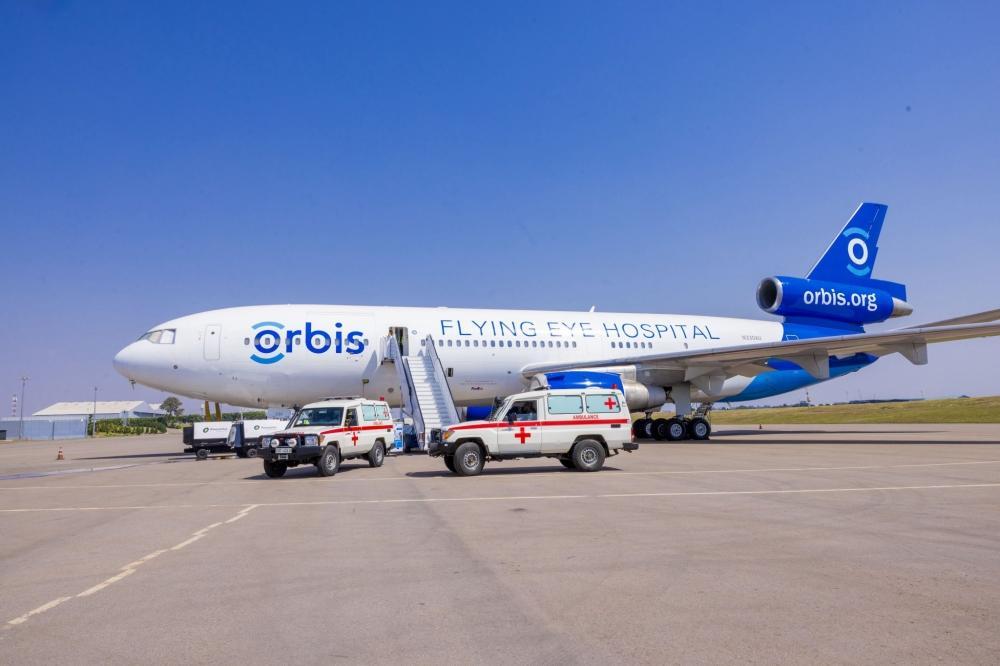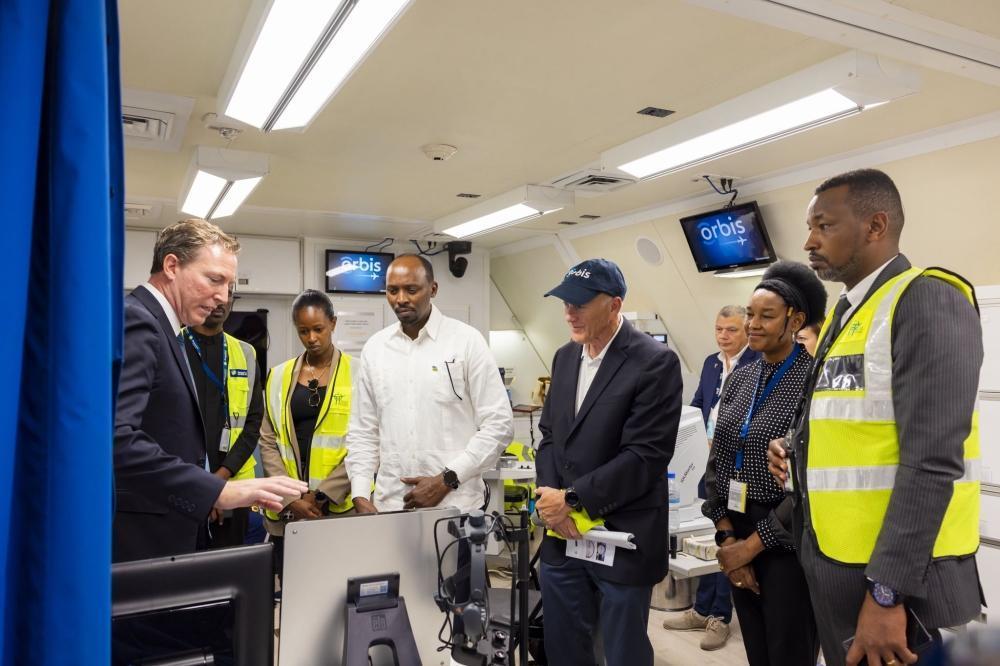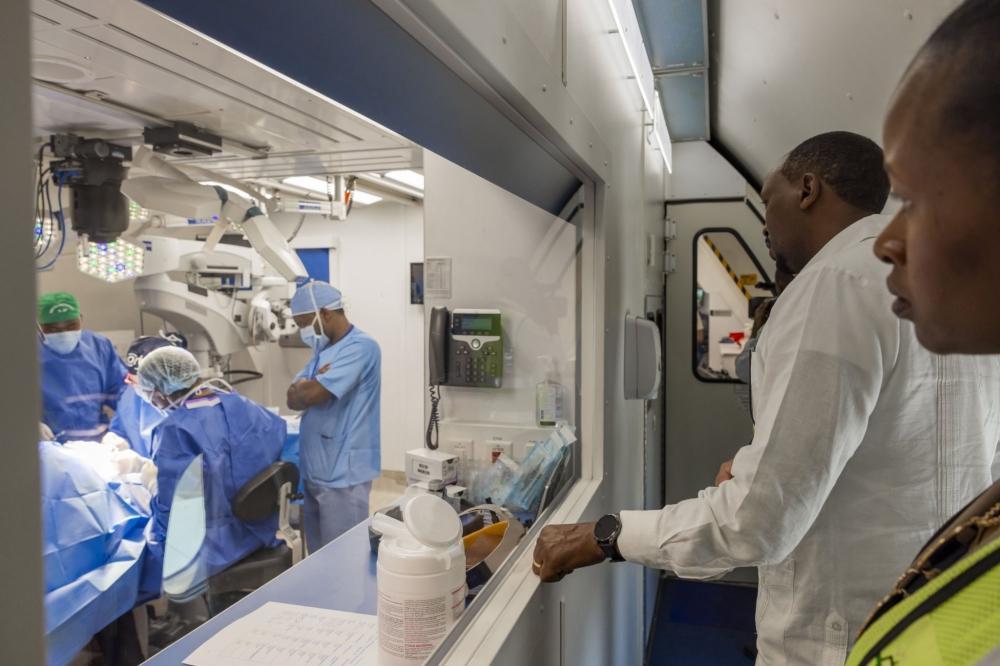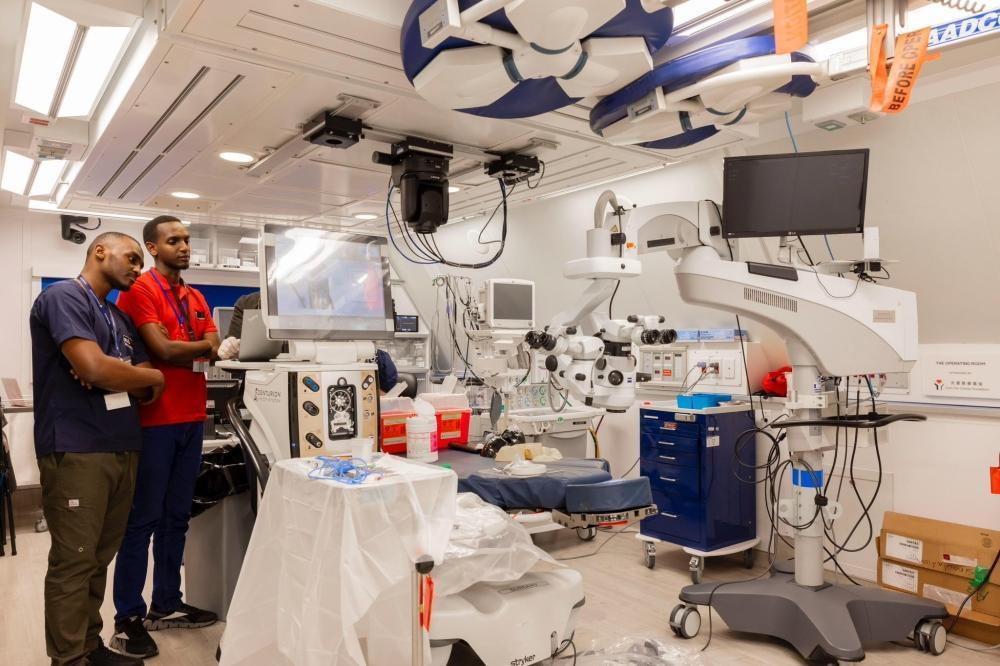Africa-Press – Rwanda. The government has partnered with Orbis International to strengthen specialised eye care services in the country, focusing on advanced technology and capacity building for medical personnel, officials announced on July 29.
The announcement was made at Kigali International Airport, where Rwandan health officials and international partners gathered to witness the treatment of patients aboard the Orbis Flying Eye Hospital, a fully equipped, accredited teaching hospital housed in an aircraft.
Operated by Orbis International, the global nonprofit is dedicated to ensuring universal access to quality eye care.
Health officials and international partners observe patient treatment aboard the Orbis Flying Eye Hospital, a fully equipped teaching hospital inside an aircraft.
The visit marks the aircraft’s first mission to Rwanda and its 84th country since inception. It will support a two-week collaborative training programme aimed at improving ophthalmic care through hands-on clinical training and knowledge sharing.
The Minister of Health, Dr. Sabin Nsanzimana, said the country aims to increase its number of ophthalmologists from the current 30 to 120 over the next four to five years.
“This number is far too low for a population of around 14 million,” he said, adding that eye and dental conditions are among the most common cases treated at health facilities.
The Orbis Flying Eye Hospital, which landed in Kigali on July 18, features an operating room, recovery room, classroom, and high-tech simulation training equipment.
According to Maurice Geary, Director of the Flying Eye Hospital, it is the only fully accredited ophthalmic teaching hospital on an aircraft globally.
Building national capacity
Dr. Nsanzimana emphasised that growing Rwanda’s specialised eye care workforce requires more trainers, equipment, and strong partnerships. He described the Flying Eye Hospital’s mission as part of a broader strategy involving the Rwanda International Institute of Ophthalmology (RIIO) and Orbis International to develop local capacity in ophthalmology.
Minister of Health Dr. Sabin Nsanzimana tours the Orbis Flying Eye Hospital following its arrival in Kigali on July 18.
“The aircraft’s stay for over two weeks is part of a wider effort focused on training and research,” he said, noting that around 200 complex cases, selected from across the country, will be treated either onboard or at Kibagabaga Level 2 Teaching Hospital.
“These are the most complicated cases, which local teams previously couldn’t manage. Now, with support from international experts and cutting-edge technology, patients are receiving care while local professionals gain practical skills,” he added.
More than 100 Rwandan healthcare workers—including doctors, anaesthesiologists, nurses, and biomedical engineers—are participating in the training. Nsanzimana said the programme will continue beyond the two-week mission through sustained collaboration between Orbis and RIIO.
Maurice Geary reiterated Orbis’ commitment to Rwanda’s long-term goal of building a stronger eye care workforce.
“We’re working closely with RIIO and the Ministry of Health to support the goal of increasing the number of ophthalmologists. Currently, there are only about two ophthalmologists per million people in Rwanda. Through sustained partnerships, we hope to change that,” he said.
AI innovation and global mission
John Howitt, Chair of the Orbis International Board of Directors, said the organisation’s mission is timely, given that over a billion people globally live with treatable or preventable blindness or vision loss.
He praised Rwanda’s health system and reaffirmed Orbis’ role in supporting its development. “What Rwanda needs is more trained eye care professionals—and that’s exactly what we’re here to help provide,” he said.
The aircraft features an operating room, recovery room, classroom, and advanced simulation training equipment for medical professionals.
Prof. Cikǔ Mathenge, Medical Advisor for Orbis in Africa and Director of Training and Research at RIIO, highlighted the programme’s use of artificial intelligence to screen for diabetic retinopathy, a condition that can cause blindness.
“AI is allowing us to detect the disease at very early stages—even in areas without a specialist present. This is transformative,” she said. “Orbis provides modern, high-tech tools that enable us to train eye care workers in Rwanda, and this collaboration is truly ground-breaking.”
For More News And Analysis About Rwanda Follow Africa-Press









